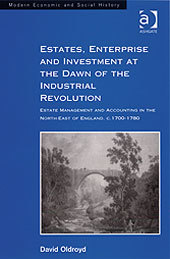At the beginning of the eighteenth century the landed estate represented the largest and most clearly defined type of business organisation in existence in pre-industrial England. Given the need for capital, wayleave rights and a ready supply of coal, iron and other raw materials it is unsurprising that most historians tend to place Britain's formative industrial development on such estates where all these elements were available. Yet despite this consensus, relatively little attention has been paid to the management and accountancy practices of these estates, which have the potential to reveal much about the development of the industrial revolution. In this study the management practice on estates in the north-east of England (c.1700-1780) is examined through the lens of the accounts and supporting documentation. Accounts encompassed every aspect of estate operations from the housekeeper's groceries to the lead and coal mines, and thus provide direct evidence of the underlying management systems over a diverse range of activities. The information flows on estates serve as an excellent medium for testing hypotheses concerning the management of estates and the attitudes of their owners and stewards. Focusing on the surviving accounts of three leading gentry families, Bowes, Ridley and Cotesworth, who came from contrasting social backgrounds, two main issues are addressed. The first concerns the productivity of estates. Were estates managed efficiently as productive investments, and more specifically, to what extent can the landowners and their stewards legitimately be described as capitalists? The second, related, question asks in what ways did accounting aid managerial activity at this early stage of industrial development? These are the central questions this book addresses through examination of the nature and function of accounts within the organisation. By looking in detail at records from this crucial region during the period of transition to an industrial




